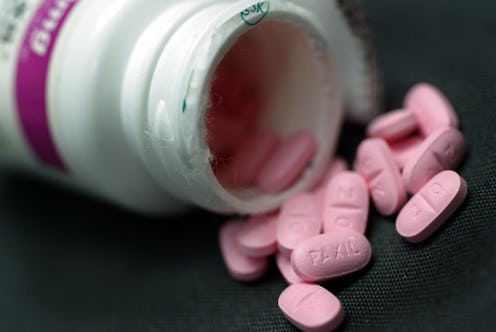Life
A Study Looked At How Effective 21 Different Antidepressants Are & Here’s What It Found

Major depressive disorder can be debilitating, and finding the right medication to feel better is sometimes a frustrating process. Just like any other medication, antidepressant medications aren't one-size-fits-all — what works for you may not work for another patient. But a new study says some antidepressants are more effective at treating major depressive disorder, a finding that could impact how prescribers choose medications for their patients.
Researchers from the University of Oxford, Kyoto University in Japan, the University of Bern in Switzerland and other universities around the world contributed to the study. They analyzed 522 controlled trials with 116,477 participants before reaching a conclusion. "These results should serve evidence-based practice and inform patients, physicians, guideline developers, and policy makers on the relative merits of the different antidepressants," the study says. It was published Wednesday in journal The Lancet.
The study also compared antidepressants to placebos and found antidepressants were more effective than placebo drugs across all the clinical trials. The only exception was clomipramine (Anafranil) — patients taking Anafranil were more likely to drop out of a study than patients taking the placebo drug. The study's lead author, Dr. Andrea Cipriani, told TIME that the study "is the final answer to the controversy" about whether antidepressants are beneficial. “This is the largest and most robust study ever in antidepressants,” Cipriani told the publication. “And we found good news that they work, and outweigh the side effects.”
If you're wondering why it's such big news that these antidepressants were proven effective (because, well, shouldn't they be?), it's helpful to understand some more of the context behind these studies. "With all available data included, previous analyses have cast doubt on the overall effectiveness of antidepressants, particularly for more mild depression," Dr. Steve Levine, a board certified psychiatrist and the founder and CEO of Actify Neurotherapies, tells Bustle. "This study is important because of the size, scope, and inclusiveness of data analyzed that counteracts a growing cynicism around depression medications."
It may seem confusing that some antidepressants are deemed more effective than others, but they aren't all identical. According to Healthline, there are more than 10 types of antidepressant drugs. The study doesn't call out any particular class of drugs as being more effective, but it did find that some antidepressants have better results than others.
If you're taking one of the drugs that's been deemed less effective by the study, however, don't panic. If a medication is working for you, that's what's important, regardless of this study's findings. But if you're searching for a new antidepressant because your current medication isn't working well, it may be worth having a conversation with a doctor.
"While this study stratifies medications into groups of more and less effective, it is important to still consider all medications as options when treating depression," says Dr. Levine. "While some may pop out here as more effective in a large population, much of what practically separates one choice from another is the side effect profile, which can be highly individual. Almost all [antidepressants] have side effects that include weight gain, sexual dysfunction, gastrointestinal distress, and more." Dr. Levine also points out that not all patients will respond to traditional treatment for depression.
While the study's findings are encouraging, more research needs to be done about how to properly treat mental illness. This study didn't address patients with treatment-resistant depression — even though antidepressants have been shown to work, not all people respond to medication. A 2012 study published in journal Patient Preference and Adherence found that 10 to 30 percent of people taking antidepressant medications will either not see any improvement or worsen thanks to "functional impairment, poor quality of life, suicide ideation and attempts, self-injurious behavior, and a high relapse rate."
So what does this mean for an average person who takes antidepressants? Even if you feel like your antidepressant isn't working, it's important not to adjust your dosage without talking to a medical professional. Any medication changes should be discussed with your doctor.
Antidepressant medications are effective, and they can make a huge difference for people dealing with major depressive disorder. This study may help doctors prescribe the ideal medication for a patient right away instead of cycling through several medications to see what feels best, which would make the sometimes-tiring treatment process feel much easier.